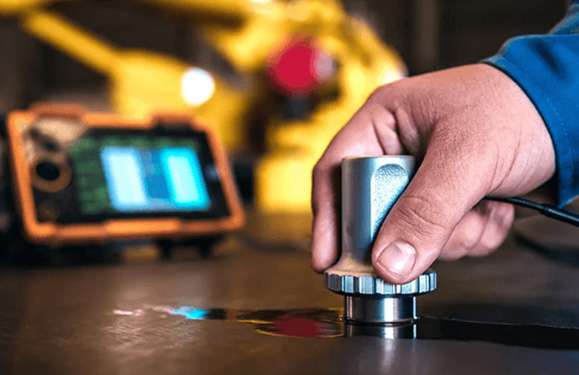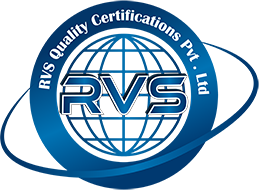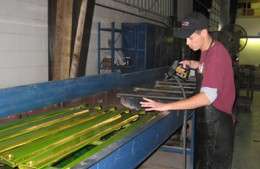I have been out of industrial activity after completing my graduation for about 2 years, then RVS Quality Certifications Pvt Ltd has changed my outlook on my career. Adopting a course in NDT has helped me launch my career.
Non Destructive Testing Services
- By: Admin

Product and structural integrity is compulsory in almost all the industries. To maintain safety and performance standards, non-destructive testing (NDT) is one effective means. It allows for safe inspection and quality assessment of materials without causing damage to them. From aerospace to construction, industries are reliant on advanced Non Destructive Testing Services offered by RVS Quality Certifications Pvt. Ltd. to detect hidden defects and meet stringent quality standards. But just how does the process work, and what makes it such a valuable tool for quality assurance?
Related Topics: Top 5 Benefits Of Non Destructive Testing
How Non-Destructive Testing Works
NDT covers a broad range of means: it involves checking the materials, structure, and components without changing their usability. Unlike destructive testing, which usually requires cutting or breaking materials to assess their properties, NDT allows for general evaluation while keeping the object intact. The process generally starts with choosing suitable methods for testing considering the material, industry requirements, and type of defects being tested. Some frequently used NDT methods are as follows:
- Ultrasonic Testing (UT): The application of ultrasonic waves for the identification of internal discontinuities.
- Radiographic testing (RT): It makes use of either x-rays or gamma rays and is used for imaging the internal structure of parts.
- Magnetic Particle Testing (MPT): Detects surface and near-surface cracks in ferromagnetic materials through the use of a finely divided ferromagnetic powder mixed with a suitable carrier.
- Liquid Penetrant Testing (LPT): Identifies small surface cracks using a liquid dye to penetrate the material.
- Eddy Current Testing (ECT): Detects defects in conductive materials through the principle of electromagnetic induction.
Each of the above methods is chosen considering the specific particular conditions of industry and in term of test material.
Explore More: 6 Untold Advantages Of Non Destructive Testing Services
3 Hidden Advantages of Non Destructive Testing Methods
Advantages of NDT for Quality Assurance
Assures up to the maximum proportions of the quality measure by employing a more reliable and productive means of assessment of material and structural condition. This includes early defect discovery, which is usually done prior to the defect maturing into complete failures. Most of the structural defects are internal cracks or material degradation that can remain hidden from naked human eye detection. Without any testing, accruing all such unnoticed defects would eventually end up costing huge repair costs or, worse, catastrophic failures. Another consideration is that the importation is done by non-destructive testing, which is why NC shall not be prevented from doing its inspection without interruption of production or disturbance by material replacement. So, operation will not be broken, and hence, we will eventually have a reduction in downtime and repair costs.
Benefits of NDT Keeping Assurance Quality:
- Preventing Structural Failure With Discovery of Defects.
- Cost-saving because less material wastage involved, less burden for heavy repairs.
- Safety compliance with industrial regulations and norms.
Real-time inspections without interrupting work processes results in increased operational efficiency.
Less environmental impact occurs, with no need to dispose of damaged materials after tests, thus becoming a sustainable option for industries that need to cut down on waste and enhance efficiency.
Sectors That Take Advantage of Non-Destructive Testing
Many sectors interact to the application of advanced testing techniques to ensure reliable and durable structures and products. In the aerospace industry, components such as wings, engines, and fuselage are subjected to inspection using NDT procedures. With great safety risk concerns in air travel, slightest possible defect can have grave outcomes. Correspondingly, pipelines and storage tanks in oil and gas are regularly inspected to avoid any leakage or structural failure. Corrosion, cracks, or welding defects could compromise safety and demand routine testing.
Other Industries That Use NDT:
- Automotive Manufacturing: To ensure weld integrity and structural strength in components for transport.
- Construction: The infrastructure is tested for durability and stability for bridges, buildings, roads, and other similar uses.
- Power Generation: This is to preclude operational hazards caused by the turbines, boilers, and reactors.
No matter which sector it belongs to, conducting immaculate inspections without damaging materials is well regarded and is an NDT Level 2 Certification Courses advantage for the assurance of quality.
A Pillar for Reliable and Safe Operations
Non-destructive testing holds a pivotal role in ensuring the framework of maintaining safety, cost, and regulatory parameters. By detecting early and thereby preventing failures, the midpoint of industries is to ensure that products can be manufactured and infrastructure can be maintained without disruption in activities. With advancing technology, the future of non-destructive testing looks to be brighter and more sophisticated, and hence it will form an integral part of quality assurance mechanisms today. Regular inspection is an investment worth making—not just for safety but also for business health.
RVS is the absolute best value to learn Aerospace NDT Training Course to nurture my skills. I am completely satisfied with how affordable the service they provide. Thanks RVS Team for constant support.
I would like to thank RVS for their time and patience in helping me learn and grow with my NDT courses. I was able to work and learn at the same time, with no pressure. I would recommend RVS to anyone seeking to work and take courses at the same time. I accomplished the course and today I'm a Certified PCN Level II UT engineer.
RVS helped our new hires to acquire the comprehensive training they need, as well as for refresher courses for our current employees. This has worked well for us in obtaining the necessary NDT certifications.
Just a few lines to express my gratitude for your outstanding service over the past year. We would have no issue in referring to your organisation because of your customer devotion and professionalism.
NDT is employed in a wide range of industries, including oil and gas, aerospace, energy, power, nuclear, and transportation, with nearly endless career opportunities. A job in NDT is extremely dynamic, and ongoing training is required.
One of the advantages of a four-year NDT programme is that students can study in a more focused and instructive manner. For graduates, this offers up a plethora of new NDT employment options, including quality assurance, management, engineering design, research, NDT training, and teaching.
Non-Destructive Testing (NDT) Training Courses - Levels 1, 2 and 3.
The PCN (Personnel Certification in Non-Destructive Testing) is a programme that meets the BS EN ISO 9712 requirements for NDT technicians and supervisors. It is founded in the United Kingdom, but it has an impact on a number of countries in the European Union.


-and-how-does-it-workwi3m.jpg)





